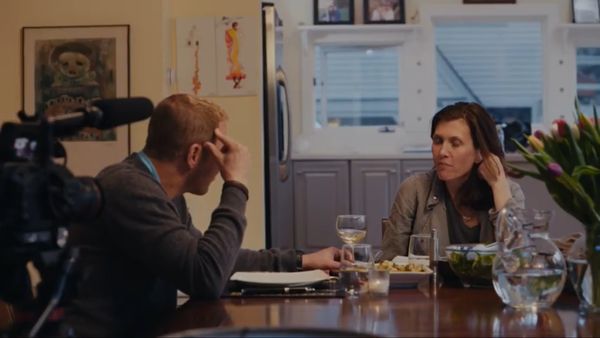Eye For Film >> Movies >> FM-2030 (2018) Film Review
FM-2030
Reviewed by: Jennie Kermode

"I am a 21st century person who was accidentally launched in the 20th. I have a deep nostalgia for the future," said FM-2030.
He never made it into the 21st Century, dying in July 2000 from pancreatic cancer - but his story may not yet be over. A passionate transhumanist, he had his brain cryopreserved, cooled down until it reached what is in effect a state of suspended animation. The technology used for doing this is getting better and better. FM-2030's brain was vitrified to prevent ice crystals from forming and damaging his cells. The real challenge lies in reviving such subjects without harming them in the process. This is something that most of those who arrange to be cryopreserved don't expect to happen until far into the future. But the thing about tomorrow is that it never comes. What if the right time is now?
Johnny Boston was just ten years old when he and FM first met. He was immediately fascinated by the influential author. This film, made under the guise of a conventional tribute, chronicles his efforts to be there with his documentary crew when his friend and hero returns from the dead. It's difficult to tell how much of it is true (the revival of a pig that we see here, for instance, doesn't seem to have been reported in any relevant journal, though pig heart valves and blood vessels were vitrified and then revived in 2017) and how much of it is fiction used to speculative effect, but ultimately that may not matter very much. Here, the ideas are more important than the flesh.
Events in the film are seen from a somewhat obscure vantage point as Boston claims to be making a tribute to FM in order to extract funding from his widow. Indeed, it's the parts of the film focused on FM himself, directly exploring his own story and ideas, that are the most interesting. The ethical issues around Boston's behaviour will, for many viewers, call to mind Beniamino Barrese's The Disappearance Of My Mother which, though not concerned with transhumanism, embodies a similar voyeuristic obsession; here, too, the act of viewing comes to feel like complicity.
Obsession like this can play havoc with editing and there are times when this film feels almost wilfully obscure (though intriguing) in its exploration of the science involved in cryopreservation, before it swings wildly in the other direction and unspools, far too slowly, philosophical musings on death, immortality and the morality of humans altering their destiny that feel as if they're aimed at children. This latter problem is thankfully mitigated by a series of interviews with more capable thinkers and with people who knew FM personally and understood his passion. This allows the film to move on to less obvious discussion around issues like human adaptability, which also help to ward off the undercurrent of ableism often present in such contexts.
There are many twists and turns along the way as the clock ticks down toward a possible attempt to revive FM, with personal desires balanced against considerations of safety and with, behind it all, the awareness that those who are revived first are the least likely to be revived successfully. FM nevertheless stated his desire to be a pioneer. Although he spoke often of his determination not to die, this suggests that ultimately the development of the technology necessary to preserve and revive others was more important to him than his own survival. His interest in the freedom offered by defeating death was not simply about personal survival and this becomes important where the film examines the way that his ideas have been approached by others.
As the inevitable suggestion is made that we all achieve immortality of a sort through the way that others remember us, this issue of misrepresentation and contested legacy rises to the surface again, where it might give the viewer pause for thought. The question then is: to what extent can Boston represent FM rather than his own imagined version of the dead man? This film is as interesting because of its failures as its successes. It's a piece of work that needs to be viewed critically, cautiously, but it will leave you with a lot to think about.
Reviewed on: 21 Feb 2020














